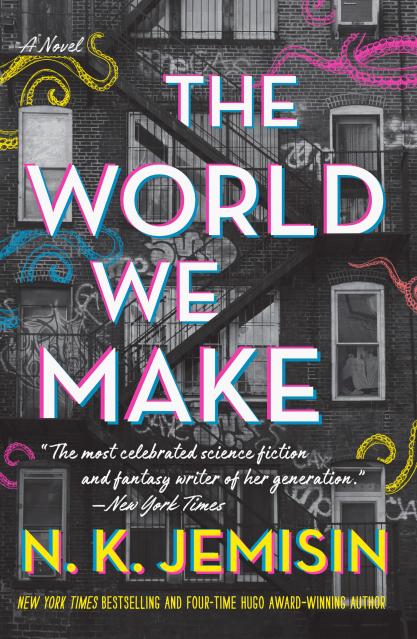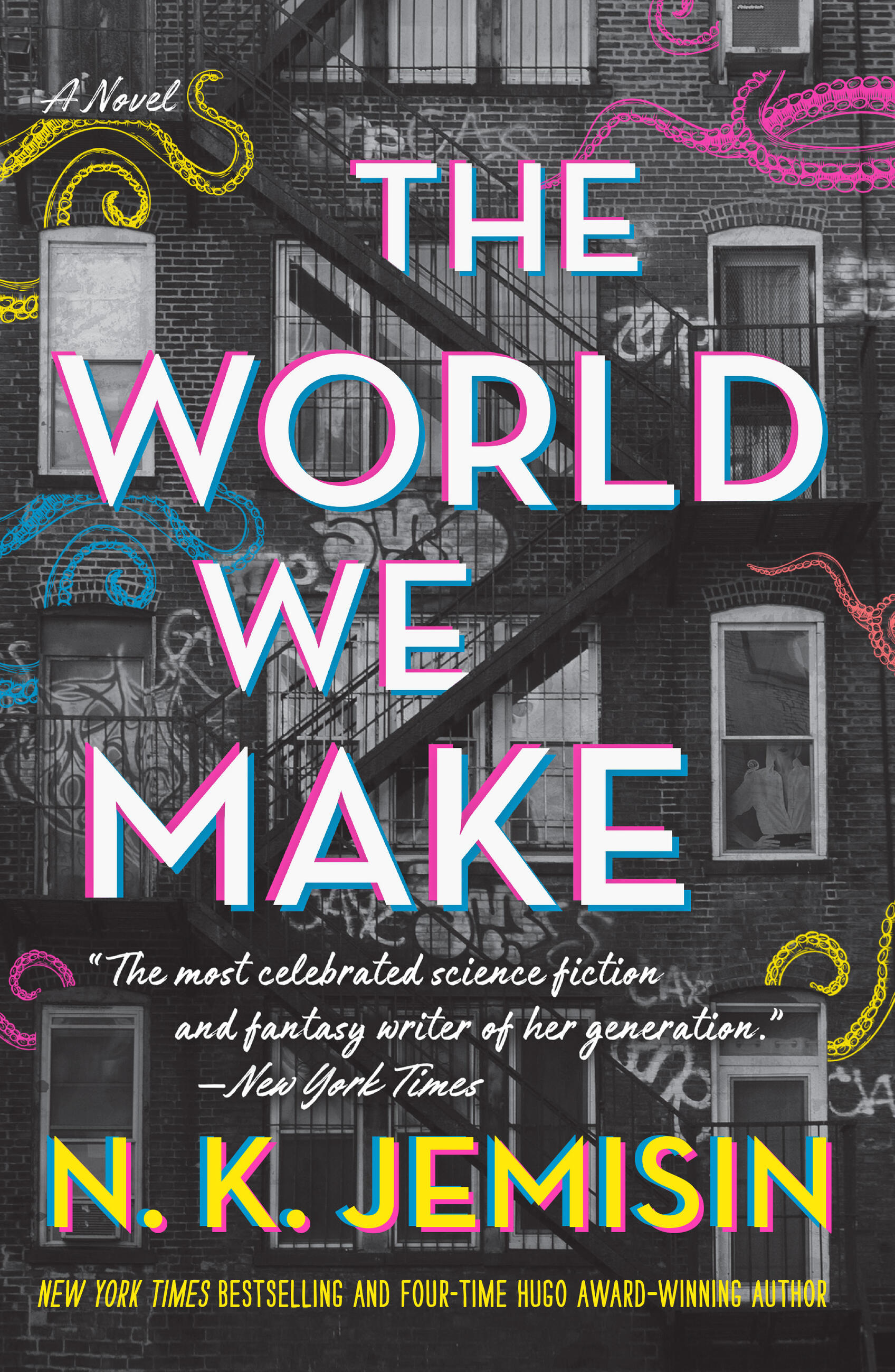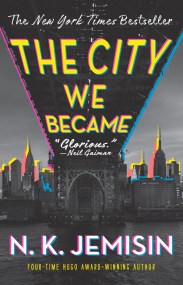Promotion
Sign up for our newsletters to receive 20% off! Shop now. Exclusions apply.
By clicking “Accept,” you agree to the use of cookies and similar technologies on your device as set forth in our Cookie Policy and our Privacy Policy. Please note that certain cookies are essential for this website to function properly and do not require user consent to be deployed.
The World We Make
A Novel
Contributors
Formats and Prices
Price
$18.99Price
$23.99 CADFormat
Format:
- Trade Paperback $18.99 $23.99 CAD
- ebook $9.99 $12.99 CAD
- Hardcover $30.00 $38.00 CAD
- Audiobook Download (Unabridged) $31.99
This item is a preorder. Your payment method will be charged immediately, and the product is expected to ship on or around October 24, 2023. This date is subject to change due to shipping delays beyond our control.
Also available from:
Four-time Hugo Award-winning and New York Times bestselling author N.K. Jemisin crafts a glorious tale of identity, resistance, magic and myth.
All is not well in the city that never sleeps. Even though the avatars of New York City have temporarily managed to stop the Woman in White from invading—and destroying the entire universe in the process—the mysterious capital "E" Enemy has more subtle powers at her disposal. A new candidate for mayor wielding the populist rhetoric of gentrification, xenophobia, and "law and order" may have what it takes to change the very nature of New York itself and take it down from the inside.
In order to defeat him, and the Enemy who holds his purse strings, the avatars will have to join together with the other Great Cities of the world in order to bring her down for good and protect their world from complete destruction.
N.K. Jemisin’s Great Cities Duology, which began with The City We Became and concludes with The World We Make, is a masterpiece of speculative fiction from one of the most important writers of her generation.
All is not well in the city that never sleeps. Even though the avatars of New York City have temporarily managed to stop the Woman in White from invading—and destroying the entire universe in the process—the mysterious capital "E" Enemy has more subtle powers at her disposal. A new candidate for mayor wielding the populist rhetoric of gentrification, xenophobia, and "law and order" may have what it takes to change the very nature of New York itself and take it down from the inside.
In order to defeat him, and the Enemy who holds his purse strings, the avatars will have to join together with the other Great Cities of the world in order to bring her down for good and protect their world from complete destruction.
N.K. Jemisin’s Great Cities Duology, which began with The City We Became and concludes with The World We Make, is a masterpiece of speculative fiction from one of the most important writers of her generation.
The Great Cities
The City We Became
The World We Make
The World We Make
For more from N. K. Jemisin, check out:
The Inheritance Trilogy
The Hundred Thousand Kingdoms
The Broken Kingdoms
The Kingdom of Gods
The Inheritance Trilogy (omnibus edition)
Shades in Shadow: An Inheritance Triptych (e-only short fiction)
The Awakened Kingdom (e-only novella)
Dreamblood Duology
The Killing Moon
The Shadowed Sun
The Dreamblood Duology (omnibus)
The Broken Earth
The Fifth Season
The Obelisk Gate
The Stone Sky
How Long 'til Black Future Month? (short story collection)
Genre:
Series:
-
"It's a glorious fantasy, set in that most imaginary of cities, New York. It's inclusive in all the best ways, and manages to contain both Borges and Lovecraft in its fabric, but the unique voice and viewpoint are Jemisin's alone."Neil Gaiman on The City We Became
-
"The City We Became takes a broad-shouldered stand on the side of sanctuary, family and love. It's a joyful shout, a reclamation and a call to arms."The New York Times
-
"The City We Became is a masterpiece of eldritch urban fantasy."Buzzfeed News
-
"Jemisin's fantastical stories are anchored in complex societal systems and fully-imagined new worlds-all with fault lines lying in wait-that aim to help us better understand our own."TIME on The City We Became
-
"Jemisin is now a pillar of speculative fiction, breathtakingly imaginative and narratively bold."Entertainment Weekly on The City We Became
-
"A love letter, a celebration and an expression of hope and belief that a city and its people can and will stand up to darkness, will stand up to fear, and will, when called to, stand up for each other."NPR on The City We Became
-
"Thrillingly expansive without ever becoming abstract or high-flown."The Los Angeles Times on The City We Became
-
"Three consecutive Hugo Awards and a cover blurb from Neil Gaiman -yes, it's time for you to pick up a novel by Jemisin, whose speculative fiction has a degree of inclusivity rare in the science-fiction world."The Washington Post on The City We Became
-
"As always, Jemisin's writing is visionary and immersive...[Jemisin is] a science-fiction/fantasy GOAT."GQ on The City We Became
-
"The City We Became is a raucous delight, a joyride, a call-to-arms, a revolution with plenty of dancing. Eat your heart out, Lovecraft."Alix E. Harrow, author of The Ten Thousand Doors of January on The City We Became
-
"Some of the most exciting and powerful fantasy writing of today... Jemisin's latest will attract ... even those who don't typically read genre fiction."Booklist (starred review) on The City We Became
-
"The most important speculative writer of her generation...She's that good."John Scalzi
-
"As raw and vibrant as the city itself."Library Journal on The City We Became
-
"A love/hate song to and rallying cry for the author's home of New York... Fierce, poetic, uncompromising."Kirkus (starred review) on The City We Became
-
"A fierce, opinionated vision of a storied metropolis facing down existential threats."Shelf Awareness on The City We Became
-
"This contemporary fantasy of living cities in a multiversal struggle demonstrates [Jemisin's] accomplished storytelling and characterization. Highly recommended for anyone interested in some of the most exciting and powerful fantasy writing of today... Jemisin's latest will attract both media attentions and curious readers, even those who don't typically read genre fiction."Literary Hub on The City We Became
-
"One of the most celebrated new voices in epic fantasy."Salon.com
- On Sale
- Oct 24, 2023
- Page Count
- 400 pages
- Publisher
- Orbit
- ISBN-13
- 9780316509909
Newsletter Signup
By clicking ‘Sign Up,’ I acknowledge that I have read and agree to Hachette Book Group’s Privacy Policy and Terms of Use








